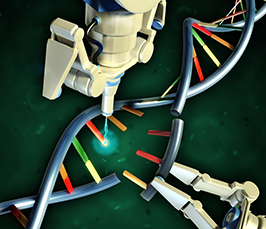CRISPR-Cas9 - Insights from a Scientific Breakthrough
Max-Planck-Forum Berlin
- Date: Nov 22, 2016
- Time: 07:00 PM - 08:30 PM (Local Time Germany)
- Speaker: Emmanuelle Charpentier, Jörg Hacker, Stefan Mundlos
- Location: Embassy of France, Wilhelmstraße 69, 10117 Berlin
- Host: Max Planck Society in cooperation with the French Embassy
- Contact: mpgberlin@gv.mpg.de

Bacteria use the system to remove foreign DNA infiltrated into their cells by viruses. This immune defence mechanism, which is deployed by microbes, is of particular interest to geneticists as it is easy to use for modifying genes and examining their functions. With CRISPR-Cas9, molecular medicine has a new universal tool at its disposal. The technique is now used throughout the world and offers considerable potential in the development of new treatment options for serious human diseases. As changes in the genome cannot be detected retrospectively and the possible applications of the new tool are not yet foreseeable, ethicists warn that it should be treated with caution.
Emmanuelle Charpentier, who decoded the CRISPR-Cas9 system with her team at the University of Umeå in Sweden between 2011 and 2012, is one of the most renowned researchers in the world today. She has been Director at the Max Planck Institute for Infection Biology in Berlin since 2015. Last year alone, she received over 30 awards for her work, including the Paul Ehrlich Prize. At the Max Planck Forum, Emmanuelle Charpentier will present the background to her discovery of CRISPR-Cas9 and discuss current possibilities for its application. Will it be necessary to formulate new ethical regulations for work on the genome due to these developments?
Panel discussion with:
Prof. Emmanuelle Charpentier, Director at the Max Planck Institute for Infection Biology
Prof. Dr. Stefan Mundlos, Group Leader at the Max Planck Institute for Molecular Genetics
Prof. Dr. Jürgen Schölmerich, Member of the Leopoldina and Emeritus of the University Hospital Frankfurt am Main
Moderator:
Dr. Alison Abbott, Senior European Correspondent for Nature
Participation in the Max Planck Forum is free of charge. We ask for your understanding that, for security reasons, we can only accept registrations containing all of the requested information, including your first name, surname and institution. Please submit your registration by 16 November 2016 to: mpgberlin@gv.mpg.de
A personal identity document is required for admission. Given that the available space is limited, we request that participants arrive in good time. Admittance is from 6 p.m. For security reasons, it is not possible to attend the event with large items of luggage.